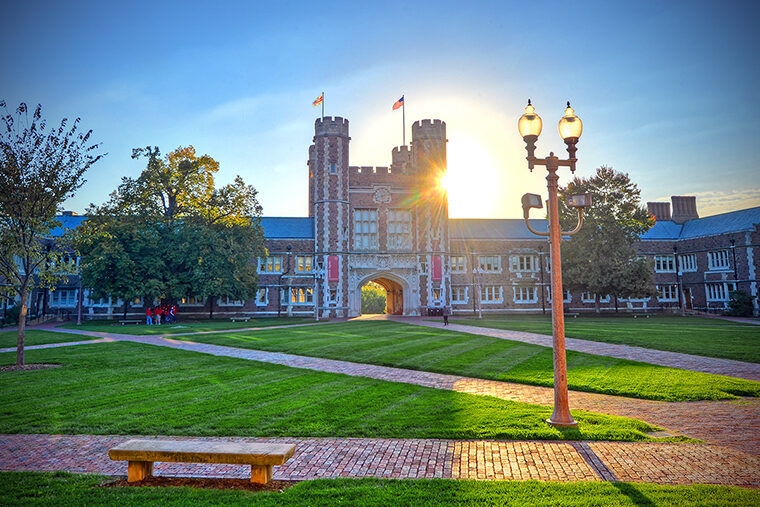Undergraduate tuition at Washington University in St. Louis will be $59,420 for the 2022-23 academic year — a $1,670 (2.9%) increase over the 2021-22 academic tuition of $57,750, announced Amy B. Kweskin, executive vice chancellor for finance and chief financial officer.
The required student activity fee will be $594. The health and wellness fee will be $576.
Charges for on-campus double-occupancy housing for 2022-23 will range between $12,178 and $12,698, depending on housing type selected. This year’s range is $11,846 to $12,350. The meal plans for 2022-23 will range from $4,824 to $6,702 compared with this year’s range of $4,638 to $6,443.
“We understand the financial commitment and sacrifices you make to send your students here, and we remain grateful for your steadfast support and partnership,” wrote Beverly Wendland, provost and executive vice chancellor for academic affairs, in a letter to parents and students about the 2022-23 tuition, room, board and fees.
“We continue our commitment to being good stewards of your investment while providing your students a world-class educational experience and preparing them to be productive members of a global society,” Wendland wrote.
“Thank you for your trust in Washington University and for your patience as we navigated the many twists and turns of the COVID-19 pandemic over the past two years,” Wendland continued. “We appreciate the steps your students have taken — from pre-arrival and entry testing to getting booster shots — to help make a safe return to campus possible. We wish your students a productive, meaningful and healthy spring semester.”
Students who qualify for need-based financial assistance will receive consideration for the cost increases, along with consideration of changes in their families’ financial circumstances.
An FAQ about tuition and the university’s financial resources was enclosed with the letter.
As noted in the FAQ, the university is dedicated to meeting 100% of demonstrated financial need for all admitted students. Half of the undergraduate student body receives some form of financial assistance (scholarships, grants and/or financial aid). In the past decade, the average annual aid award for students with need has increased from about $28,000 to $55,000. WashU also supports several initiatives that provide students the resources they need to engage fully in academic and campus life.
Under the university’s “no-loan” program, the families of undergraduate students with annual incomes of $75,000 or less receive full financial aid packages without incurring any debt. Another financial aid program, the WashU Pledge, covers the full cost of education, including tuition, room, board and fees, to all undergraduate students from Missouri and southern Illinois who are Pell Grant-eligible or from families with annual incomes of $75,000 or less.
The university continues to make substantial progress in attracting and enrolling students from low-income families, growing the number from 6% in 2013 to 17% in 2022. And last fall, Chancellor Andrew Martin announced a historic $1 billion investment in financial aid and student support that allows the university to be “need blind” in its admission process. The “Gateway to Success” initiative ensures that the university will be able to attract the best and the brightest students regardless of their financial background.
Graduate, professional programs tuition, fees
Below are the 2022-23 full-time tuition and fee schedules for the university’s graduate and professional programs as well as tuition for part-time students enrolling in evening and summer school.
Graduate/professional programs in Arts & Sciences and the McKelvey School of Engineering: The 2022-23 tuition charge for graduate students in these programs will be $59,420, an increase of $1,670 (2.9%).
Sam Fox Graduate School of Architecture & Urban Design: The 2022-23 tuition charge for the Master of Architecture program will be $57,030, an increase of $1,444 (2.6%).
Sam Fox Graduate School of Art: The 2022-23 tuition charge for the Master of Fine Arts programs will be $47,400, an increase of $1,212 (2.6%).
Brown School: The 2022-23 tuition charge for first-year students in the Master of Social Work program will be $45,700, an increase of $1,110 (2.5%), and the Master of Public Health program tuition will be $40,590, an increase of $990 (2.5%).
Olin Business School graduate program: The 2022-23 tuition for the Master of Business Administration program will be $64,250, no increase over current charges, and the Executive MBA program will be $139,950, no increase over current charges.
School of Law: The 2022-23 tuition for the JD, JSD, LLM and MLS programs will be $64,488, an increase of $1,822 (2.9%).
School of Medicine: The 2022-23 tuition, for first-year students in the School of Medicine will be $65,976 each year for their four years of medical school, an increase of $975 (1.5%). Tuition for the second-, third- and fourth-year classes was fixed for four years upon their entry to medical school and their 2022-23 annual tuition will continue at $65,001, $64,231 and $62,664, respectively. The health fee will remain stable at $2,749 and the student fee will remain stable at $1,500.
Evening and Summer School 2022-23 tuition rates
Undergraduate evening students: For undergraduate evening students enrolling in University College in 2022-23, tuition will be $695 per credit hour, compared with the 2021-22 cost of $665 per credit hour.
Graduate students in University College: Depending upon the graduate program in University College, tuition will range from $695 to $995 per credit hour for 2022-23, compared with the current range of $665 to $995.
Summer School: Tuition in Summer School classes for 2023 will remain at the current cost of $1,180 per undergraduate credit hour and the current cost of $1,420 per graduate credit hour.



